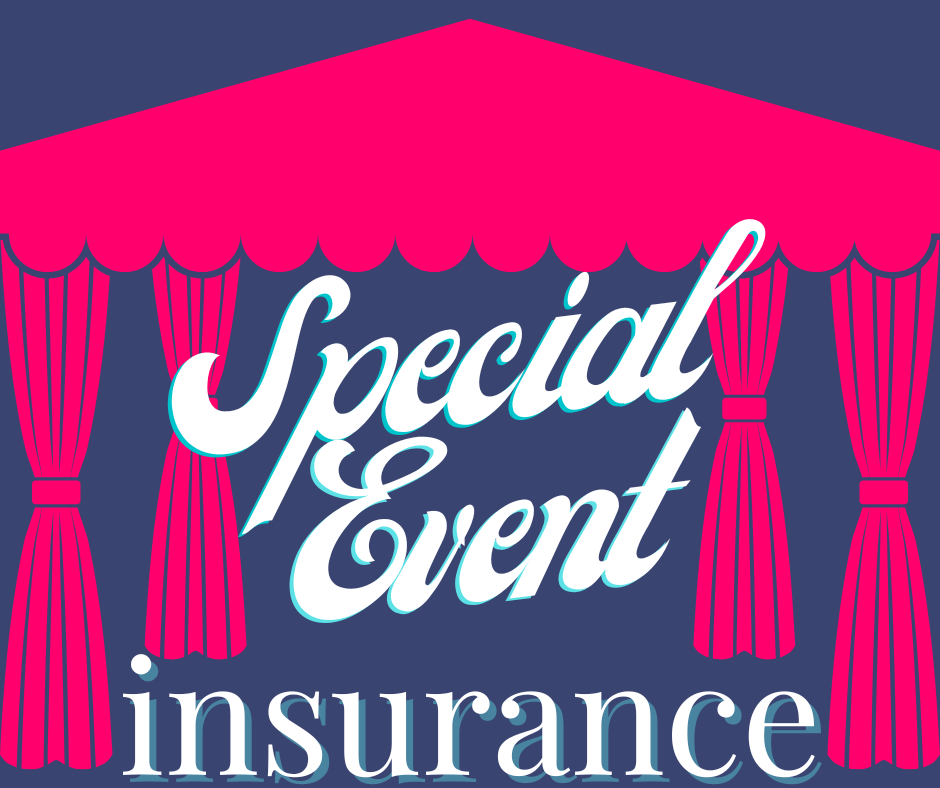Special events such as weddings, corporate gatherings, parties, or concerts can involve significant planning and investment. Given life’s unpredictability, it’s essential to protect these events from unforeseen circumstances like cancellations, property damage, or injuries. Event insurance provides financial protection, covering various risks and ensuring peace of mind for event organizers and participants. Event insurance typically includes general liability coverage, which protects against injuries or accidents that may occur during the event.
It can also include cancellation or postponement coverage in case of unforeseen circumstances like severe weather, illness, or other emergencies. Additionally, policies can cover property damage, equipment loss, and even lost deposits. By investing in special event insurance, hosts can mitigate the financial impact of mishaps and ensure the event proceeds smoothly, regardless of the challenges that may arise.
Introduction to Special Event Insurance

Special event insurance is a type of coverage designed to protect event organizers, hosts, and participants from unexpected situations or incidents that might occur during the planning or execution of a special event. These events could range from weddings, corporate gatherings, and concerts to festivals, sporting events, and charity functions. Special event insurance typically provides financial protection against risks like property damage, accidents, cancellations, and unforeseen circumstances that might disrupt the event.
Types of Special Event Insurance
Several types of insurance can be tailored to different kinds of events. Common types include:
- Event Cancellation Insurance: Covers financial losses due to the cancellation, postponement, or rescheduling of an event for reasons like weather, illness, or other unforeseen circumstances.
- General Liability Insurance: Provides coverage for third-party bodily injury or property damage that occurs during the event. This is essential for protecting against accidents involving attendees or vendors.
- Liquor Liability Insurance: Specifically for events serving alcohol, this insurance covers damages or injuries caused by intoxicated guests.
- Weather Insurance: Particularly useful for outdoor events, this type of coverage offers protection against weather-related cancellations or delays, such as storms or excessive rain.
- Equipment Insurance: Protects against loss or damage to rented or owned equipment, such as sound systems, lighting, or other technical gear.
- Host Liquor Liability Insurance: Covers legal costs and settlements in case a guest’s actions, caused by alcohol consumption at the event, lead to injuries or property damage.
- Employee and Volunteer Liability: Covers incidents that may occur while employees or volunteers are working at the event, such as accidents or wrongful conduct.
Why Do Special Events Need Insurance?
Event insurance is vital because it addresses numerous risks and challenges that can arise unexpectedly. These might include:
- Accidents and Injuries: Events involving large crowds, physical activity, or moving parts (e.g., outdoor festivals, concerts, or sports competitions) pose higher risks for accidents or injuries.
- Weather Disruptions: Outdoor events are particularly vulnerable to weather conditions. Sudden storms, high winds, or extreme heat can cause havoc, making weather insurance a crucial consideration.
- Vendor and Supplier Failures: Issues such as equipment failure, vendor cancellations, or delivery delays could lead to significant disruptions and financial loss.
- Legal and Financial Liabilities: In case of accidents, property damage, or injuries during an event, the event host could be held financially liable for medical costs, repairs, or legal fees.
- Unpredictable Cancellations: If an event needs to be canceled due to reasons outside the organizer’s control (such as illness, natural disasters, or other emergencies), cancellation insurance helps cover non-refundable expenses.
How Does Special Event Insurance Work?
Special event insurance policies are typically purchased for a short-term period that matches the event’s dates. Here’s how they generally work:

- Policy Selection: Event organizers or hosts select the types of coverage they need based on their event’s nature (e.g., general liability, cancellation, weather).
- Premium Payment: The premium amount depends on various factors like the type of event, the number of attendees, the location, and the level of coverage selected.
- Event Occurrence: If an insured event takes place—such as an accident, cancellation, or property damage—the host can file a claim with the insurance company.
- Claim Process: The event organizer will provide the necessary documentation (e.g., incident reports, medical records, proof of event cancellation) to the insurance provider. If the claim is approved, the insurer will reimburse the policyholder for covered losses, typically minus a deductible.
Factors That Influence Special Event Insurance Cost
The cost of event insurance varies depending on several key factors:
- Type of Event: Large-scale public events (e.g., festivals, concerts) generally require more coverage and come with higher premiums than smaller private events (e.g., weddings, birthdays).
- Event Duration: Longer events or multi-day events tend to have higher premiums because the risk is spread out over a more extended period.
- Event Location: If the event is held in an area with a high risk of natural disasters or other disruptions, it may increase the cost. Indoor events often cost less to insure than outdoor events.
- Number of Attendees: Larger crowds increase the risk of accidents or injuries, thus raising the cost of insurance.
- Type of Coverage: More comprehensive coverage (such as event cancellation, weather insurance, or liquor liability) will raise the premium.
- Risk Level: Events involving higher-risk activities (e.g., extreme sports, live performances) or alcohol consumption typically require more extensive insurance coverage.
- Event Equipment: If the event involves expensive equipment, such as audiovisual gear or staging, it may need additional protection against damage or theft.
Common Claims in Special Event Insurance
Understanding common claims can help event planners better prepare and mitigate risks:
- Accidental Injuries: Attendees or workers may suffer injuries due to slip-and-fall accidents, equipment malfunction, or other hazards at the event venue.
- Property Damage: Damage to rented equipment, venue property, or even the property of attendees can be a common issue that requires coverage.
- Event Postponement or Cancellation: Due to unforeseen circumstances like extreme weather, illness, or government restrictions, events may need to be rescheduled or canceled, leading to lost deposits or payments.
- Vendor Failures: If a vendor fails to deliver services as promised (e.g., food catering or sound equipment) and disrupts the event, insurance may cover the financial loss.
- Alcohol-Related Incidents: Serving alcohol at events introduces the possibility of alcohol-related accidents, requiring liquor liability coverage to handle potential lawsuits or injuries caused by intoxicated attendees.
How to Choose the Right Event Insurance for Your Special Occasion
Choosing the right insurance requires a thorough assessment of your event’s needs. Consider the following steps:

- Evaluate Risks: Consider the specific risks associated with your event, such as the potential for weather disruptions, vendor problems, or accidents.
- Match Coverage to Event Type: Make sure the insurance policy includes coverage specific to your event, such as liquor liability for parties or equipment coverage for concerts.
- Determine Coverage Limits: Ensure that the policy’s coverage limits are sufficient to protect against potential financial losses. The higher the risk of the event, the higher the limits should be.
- Review Policy Exclusions: Carefully read the policy’s exclusions to understand what isn’t covered and identify any gaps in coverage.
- Consult with an Insurance Broker: Work with an insurance broker who specializes in event coverage to get tailored advice and find the best deal for your specific needs.
- Get Quotes from Multiple Providers: Compare quotes from different insurers to ensure you’re getting the best coverage at a reasonable price.
Frequently Asked Questions
What is event insurance?
Its insurance coverage is designed to protect against unforeseen events, accidents, and losses during a special event.
What does event insurance cover?
It covers event cancellations, liability for accidents, property damage, lost deposits, and more.
Do I need insurance for a small party or gathering?
It’s optional, but even small gatherings can benefit from liability and property damage coverage.
Can event insurance cover cancellations due to weather?
Yes, weather-related cancellations are typically covered if specified in the policy.
How much does event insurance cost?
It varies based on the event size, type, location, and coverage needs, but it’s generally affordable.
Is alcohol liability covered in event insurance?
Yes, many policies offer alcohol liability coverage, which protects against accidents involving alcohol consumption.
How far in advance should I buy event insurance?
It’s recommended that you purchase it as soon as possible after booking the event to ensure complete protection.
Can I get insurance for a multi-day event?
Yes, multi-day events can be insured with extended coverage to account for the entire duration.
Conclusion
Insurance for special events is an invaluable safeguard against unexpected issues that could disrupt or derail your plans. Whether it’s a wedding, a corporate conference, or a birthday party, the potential for mishaps—such as accidents, cancellations, or property damage—can add stress and financial burden. With event insurance, you can protect your investment and reduce the risk of incurring significant out-of-pocket expenses. It ensures that even if things don’t go according to plan, you’ll have financial support to help manage the aftermath. Planning an event should be enjoyable, and with the right coverage, you can focus on creating memorable experiences instead of worrying about the “what-ifs.”




